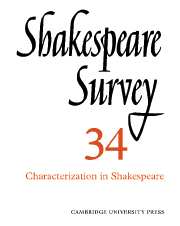Book contents
- Frontmatter
- Shakespeare’s Open Secret
- The Emergence of Character Criticism, 1774–1800
- Society and the Individual in Shakespeare’s Conception of Character
- Realistic Convention and Conventional Realism in Shakespeare
- On Expectation and Surprise: Shakespeare’s Construction of Character
- Shakespeare and the Ventriloquists
- The Rhetoric of Character Construction: Othello
- Characterizing Coriolanus
- The Ironic Reading of The Rape of Lucrece and the Problem of External Evidence
- The Unity of Romeo and Juliet
- No Abuse: The Prince and Falstaff in the Tavern Scenes of Henry IV
- Twelfth Night: The Experience of the Audience
- Plays and Playing in Twelfth Night
- Sceptical Visions: Shakespeare’s Tragedies and Jonson’s Comedies
- Shakespeare in Performance, 1980
- The Year's Contributions to Shakespearian Study 1 Critical Studies
- 2 Shakespeare’s Life, Times and Stage
- 3 Textual Studies
- Index
- Plate Section
Twelfth Night: The Experience of the Audience
Published online by Cambridge University Press: 28 March 2007
- Frontmatter
- Shakespeare’s Open Secret
- The Emergence of Character Criticism, 1774–1800
- Society and the Individual in Shakespeare’s Conception of Character
- Realistic Convention and Conventional Realism in Shakespeare
- On Expectation and Surprise: Shakespeare’s Construction of Character
- Shakespeare and the Ventriloquists
- The Rhetoric of Character Construction: Othello
- Characterizing Coriolanus
- The Ironic Reading of The Rape of Lucrece and the Problem of External Evidence
- The Unity of Romeo and Juliet
- No Abuse: The Prince and Falstaff in the Tavern Scenes of Henry IV
- Twelfth Night: The Experience of the Audience
- Plays and Playing in Twelfth Night
- Sceptical Visions: Shakespeare’s Tragedies and Jonson’s Comedies
- Shakespeare in Performance, 1980
- The Year's Contributions to Shakespearian Study 1 Critical Studies
- 2 Shakespeare’s Life, Times and Stage
- 3 Textual Studies
- Index
- Plate Section
Summary
Let the claret which Shakespeare drank, as we know, on expense account symbolize the general experience of Twelfth Night. The taste of this play has the same tension between sweetness and dryness, which translates easily into the indulgent reveries of the opening and the realities of rain, ageing, and work, in Feste’s final song. To analyse this tension is surely the business of criticism. The experience of Twelfth Night blends our sense of the title metaphor with the growing magnitude of the joke that goes too far, and with it our grasp of the relation between the gulling and romantic actions. It is a matter of changing expectations, of a modified sense of the initial données of the play. Twelfth Night is played out, as it were, on a metaphysical revolving stage, which slowly rotates through half a revolution: the profiles that were presented to us at the beginning are not those of the end. The heads remain the same, the presented view is much altered. In the end the audience is asked to revise its judgement, not simply of people, but of a convention, ‘festive’ comedy itself. And that is bound to be disturbing.
- Type
- Chapter
- Information
- Shakespeare Survey , pp. 111 - 120Publisher: Cambridge University PressPrint publication year: 1982

